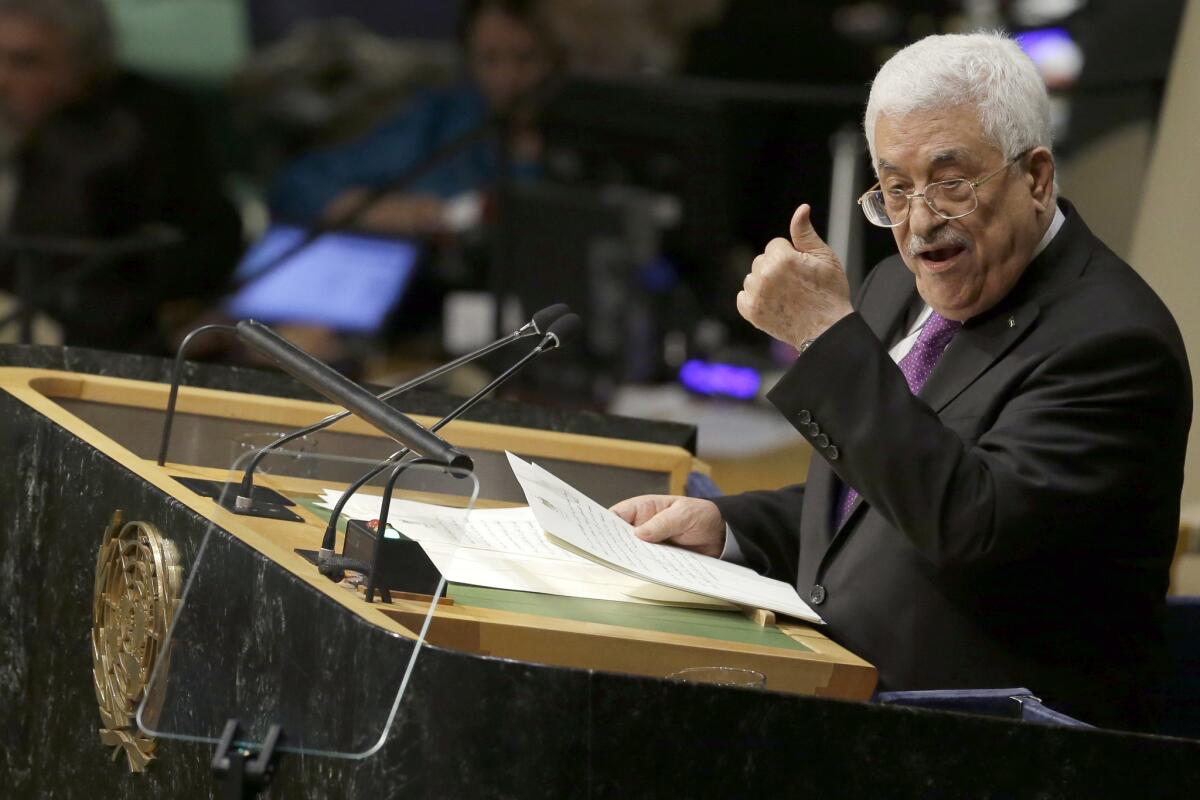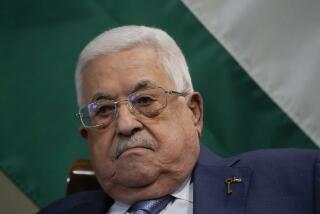An Abbas surprise: Palestinians no longer bound by 1993 Oslo peace accords

Palestinian Authority President Mahmoud Abbas addresses the 70th session of the United Nations General Assembly in New York on Sept. 30.
In a surprise move, Palestinian Authority President Mahmoud Abbas said Wednesday that his government will no longer observe the principles of the 1993 Oslo accords, a diplomatic pillar of the long search for a two-state solution to the Israeli-Palestinian conflict.
In an address to the United Nations General Assembly, Abbas said his government had no reason to abide by the accords in the face of what he called Israel’s repeated violations of their terms.
“We cannot continue to be bound by these signed agreements with Israel, and Israel must assume fully all its responsibility as an occupying power,” Abbas said.
His statement drew an immediate rebuke from the Israelis, with Prime Minister Benjamin Netanyahu’s office releasing a statement saying the speech was “deceitful and encourages incitement and lawlessness in the Middle East.”
Netanyahu’s office called on Abbas to “enter into direct negotiations with Israel without preconditions. The fact that he – time and again – has refused to do so is the best possible proof of the fact he does not intend to reach a peace agreement.”
NEWSLETTER: Get the day’s top headlines from Times Editor Davan Maharaj >>
Abbas’ statements seemed to reflect his growing frustration after years of impasse in the peace effort. Two initiatives by the Obama administration to finalize a peace agreement have failed, and the Palestinians complain their leverage with Israel is declining while Israeli settlers expand their hold on territory in the West Bank.
But while the announcement was dramatic, the practical effects of the move were not immediately clear. Experts noted that Abbas didn’t specify which agreements related to the accords he intended to repudiate, if any.
“He didn’t say he was going to stop security cooperation with Israel; he didn’t say if he intended to dissolve the Palestinian Authority,” said Robert Danin, a former U.S. diplomat in the Middle East who is now with the Council on Foreign Relations. “He left more questions unanswered than answered.”
In making threats without clear consequences, “in my judgment he makes the Palestinians look hopelessly weak,” said Aaron David Miller, a longtime U.S. peace negotiator who is now a vice president at the Wilson International Center for Scholars in Washington.
He said Abbas’ recent moves have failed to mobilize Palestinians, while alienating the Obama administration as well as the Israelis.
Josh Earnest, the White House press secretary, said the Obama administration needed to study Abbas’ speech. But he said that the White House continues to support the accords and the so-far-fruitless quest for a Palestinian state.
Abbas is also under pressure because his popularity is declining as his career nears its end.
He has been seeking to increase the Palestinians’ leverage through diplomatic means, such as winning United Nations recognition of Palestinian statehood and gaining membership in international organizations. On Wednesday, the Palestinian flag was raised over the U.N. for the first time, in another symbolic move.
Yet the cause has been eclipsed as world attention has turned to other Mideast conflicts, such as the war in Syria and the struggle against the militant group Islamic State.
President Obama didn’t mention the Israeli-Palestinian conflict in his sweeping address to the General Assembly on Monday. Although Secretary of State John F. Kerry continues to signal his commitment to seeking a peace deal, Obama is known to consider any agreement extremely unlikely.
Hundreds of Palestinians turned out in major West Bank cities during Abbas’ speech, waving the Palestinian flag and applauding as they watched him on large screens placed in the city centers.
Bassam Salhi, member of the Palestine Liberation Organization executive committee, said that Abbas has not declared the end of the Oslo accords but that the speech represented “a step to gradually move away from the Oslo accords.”
He stressed that Abbas “was not going to dissolve the Palestinian Authority or anything else but that he wants to only end the authority’s commitment to the agreements.”
Special correspondents Batsheva Sobelman in Jerusalem and Maher Abukhater in Ramallah, West Bank, contributed to this report.
Follow @richtpau on Twitter for news related to U.S. foreign policy.
ALSO
Richard Glossip’s final appeal denied: See his long road to Oklahoma’s death row
Russian jets launch attacks in Syria; U.S. questions who’s being targeted
Muslim man accused of eating beef is beaten to death in India
More to Read
Start your day right
Sign up for Essential California for news, features and recommendations from the L.A. Times and beyond in your inbox six days a week.
You may occasionally receive promotional content from the Los Angeles Times.







